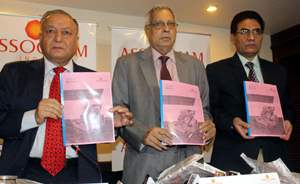
Excelsior Correspondent
JAMMU, Oct 18: With over 70 per cent of J&K State’s population depending upon agriculture for its livelihood, the State needs to double its agriculture production including both horticulture and food grains from current level of about five million tonnes.
General secretary of the ASSOCHAM, D S Rawat while releasing a joint study at a press conference here today said, “Though, about 33 lakh people in J&K is directly or indirectly engaged in agriculture and allied activities, the State runs a net food grain deficit owing to various factors like single cropping season in high altitude areas, low technological advancement, inferior quality of seeds and primitive agricultural practices.”
The study titled ‘Agri-food business outlook in J&K,’ conducted by ASSOCHAM jointly with expertise firm RNCOS, was formally released by DS Rawat, secretary general along with the Chamber’s Cyber Security Council chief, Babu Lal Jain and senior director, OS Tyagi during the conference.
It said that the food and agro-based products attracted investments worth about Rs 233 crore as of 2015-16 i.e. which is less than even one per cent of the total outstanding investments worth about Rs 2 lakh crore attracted by J&K in various sectors both from public and private sources.
However, investments attracted by food and agro-based industries in J&K increased almost 10 times from just over Rs 20 crore attracted by the State as of 2010-11, thereby showcasing the immense potential for growth in the sector.
The dairy production in J&K has been clocking annual growth rate of about 19 per cent and has the potential to cross five million tonnes (MT) mark from about two million tonnes recorded in 2014-15. Strengthening of dairy farms, genetic up-gradation of cattle through induction of genetic variability in female germ plasma and establishment of goat units are some of the key initiatives that can help boost dairy production in the State, the study suggested.
Considering that fisheries sector holds significant potential in terms of promoting entrepreneurship, it is suggested that State Government should impart technical knowhow and apprise the fishermen community with latest equipment and techniques, modern prevalent practices to enhance fisheries production which reduced to 12,800 tonnes in 2014-15 from about 20,000 tonnes a year ago, it recommended.
It has also suggested the State Government to include food and agro processing sector in thrust industries’ category and extend special incentives and bonuses.
The State should aim to make agriculture more productive, sustainable, remunerative and climate resilient by promoting location specific, integrated/composite farming systems. Apart from this, steps should be taken to encourage improved agronomic practices for higher farm productivity, improved soil treatment, increased water holding capacity and judicious use of chemicals.

